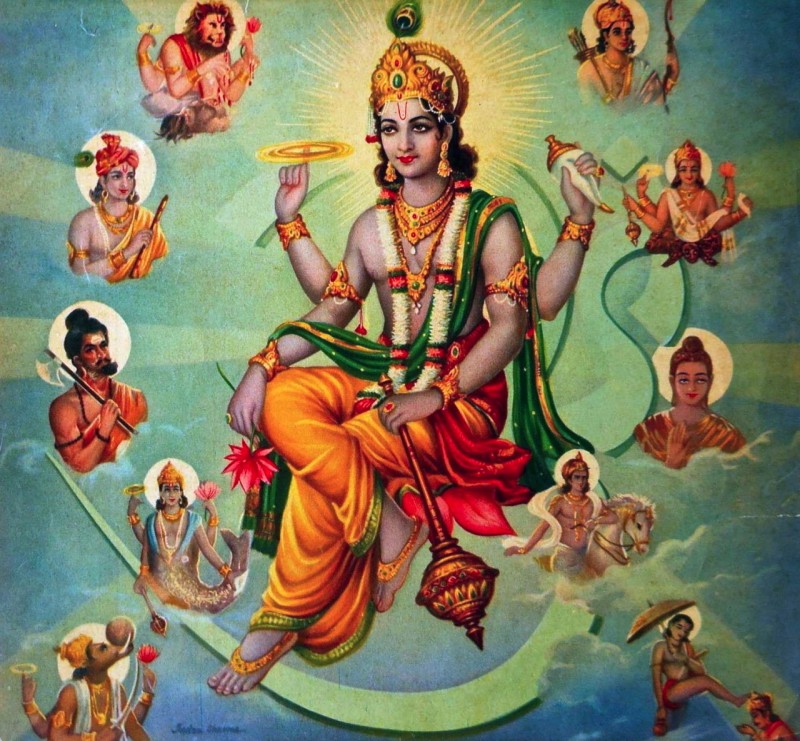
Vaishnavism is one of the major traditions within Hinduism, focusing on the worship of Lord Vishnu and his various incarnations. With a history spanning thousands of years, Vaishnavism has played a significant role in shaping the religious and cultural landscape of India and has garnered followers worldwide. Vaishnavism stands as a testament to the enduring power of devotion and spirituality. Its teachings of love, compassion, and surrender to the divine have inspired countless individuals on their spiritual journey. Through the centuries, Vaishnavism has enriched the cultural tapestry of India and continues to serve as a guiding light for seekers of truth and spiritual solace both within the Indian subcontinent and beyond.
Vaishnavism's origins can be traced back to ancient texts, particularly the Vedas, which are among the oldest scriptures known to humankind. The Rigveda, in particular, mentions Lord Vishnu as one of the principal deities. However, the more prominent development of Vaishnavism can be observed in the later sacred texts, such as the Mahabharata and the Puranas. According to Vaishnavism, Lord Vishnu is the supreme being who manifests in various incarnations (avatars) to protect dharma (righteousness) and guide humanity towards spiritual liberation. Some of the most well-known incarnations include Lord Rama and Lord Krishna, both of whom have inspired profound devotion and worship among followers.
Vaishnavism is renowned for its emphasis on bhakti, which means devotion or loving surrender to the divine. Devotees of Vaishnavism cultivate a deep emotional connection with Lord Vishnu or his incarnations, expressing their love and reverence through prayer, singing hymns (bhajans), and participating in various religious rituals and festivals. Bhakti is considered the most accessible and inclusive path to spiritual realization. It is believed that sincere devotion and unwavering faith can lead one to experience the grace of the divine, irrespective of their social background or intellectual capabilities. Vaishnavism has an extensive body of sacred texts, which are classified into two categories: Shruti and Smriti. The Vedas and Upanishads fall under the category of Shruti, while the Puranas, Itihasas (epics like the Ramayana and Mahabharata), and various other texts are considered Smriti.
The Bhagavad Gita, a part of the Mahabharata, holds particular significance within Vaishnavism. It is a sacred dialogue between Lord Krishna and the warrior prince Arjuna, wherein Lord Krishna imparts spiritual wisdom and guidance on duty, righteousness, and the path to liberation. Over time, Vaishnavism has branched into various sects, each with its unique practices and philosophical interpretations. Some of the notable Vaishnavite sects include:
Sri Vaishnavism: This tradition, founded by Ramanuja in the 11th century, emphasizes the concept of Vishishtadvaita, which means qualified non-dualism. It posits that the individual souls are eternally connected to the Supreme Soul (Brahman) and can attain moksha (liberation) through devotion, knowledge, and righteous actions.
Gaudiya Vaishnavism: Also known as Chaitanya Vaishnavism, this sect was founded by Chaitanya Mahaprabhu in the 16th century. It places a strong emphasis on the chanting of the Hare Krishna mantra and considers Krishna as the supreme form of God.
ISKCON (International Society for Krishna Consciousness): A modern-day global movement, founded in 1966 by A.C. Bhaktivedanta Swami Prabhupada. ISKCON follows the Gaudiya Vaishnavism tradition and seeks to propagate Krishna consciousness and bhakti worldwide.
Due to its universal appeal, Vaishnavism has transcended geographical boundaries and gained followers worldwide. Temples dedicated to Lord Vishnu and his incarnations can be found in various countries, and Vaishnavite festivals are celebrated with enthusiasm and devotion by communities outside India.
Also read -Shiv Chalisa: Devotional Verses Honoring Lord Shiva
Samkhya Yoga: The Path of Knowledge and Self-Realization
The Gayatri Mantra: An Ancient Hymn of Enlightenment and Divine Light